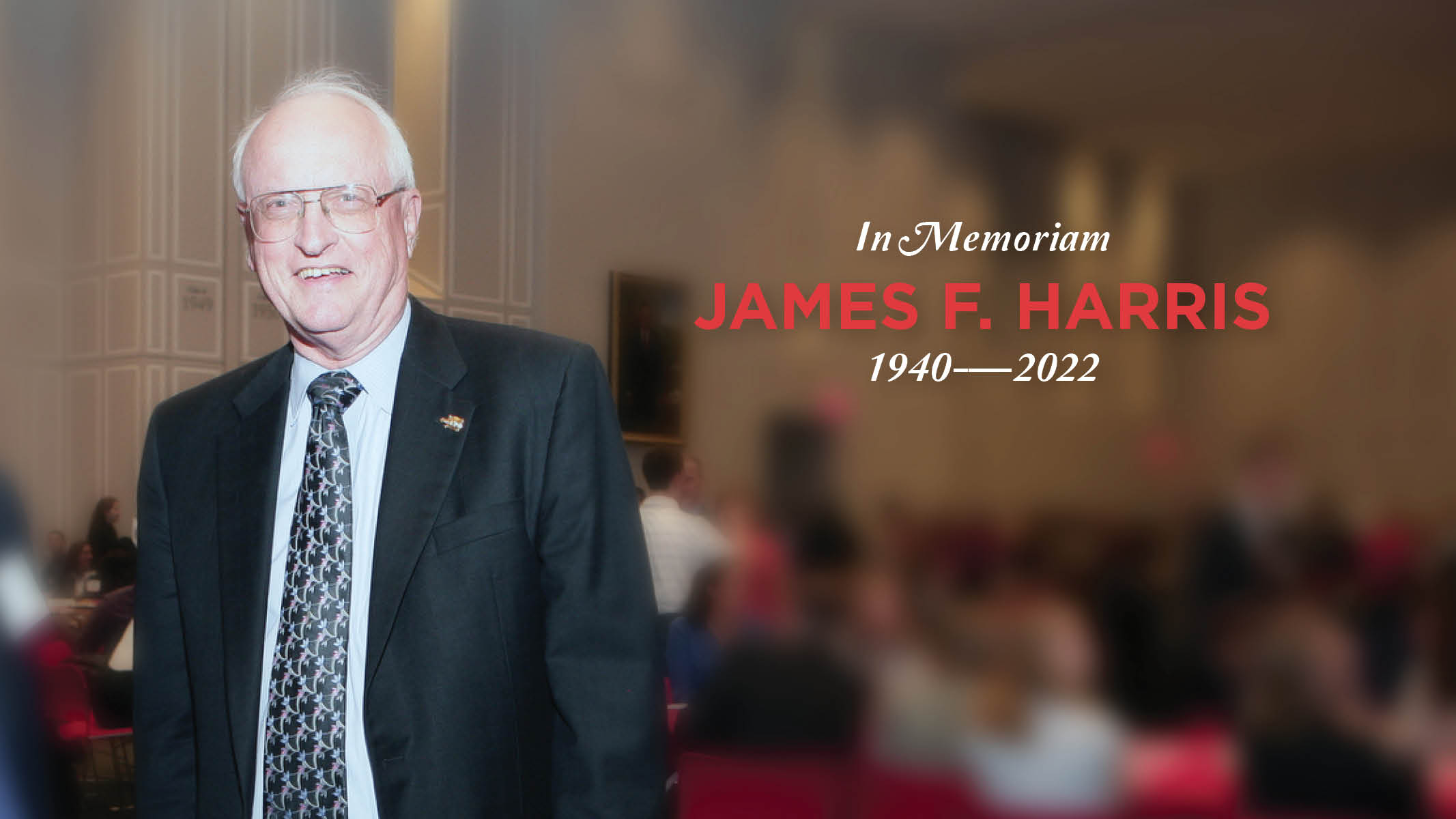James F. Harris, Professor Emeritus and Longtime Dean at UMD, Dies at 81
March 04, 2022

Harris spent 45 years on campus; leaves a legacy of innovation in the arts and humanities.
James F. Harris, 81, eminent scholar of 19th-century German history and longtime dean of the College of Arts and Humanities (ARHU) at the University of Maryland, died Feb. 22, 2022, of heart disease at Johns Hopkins Hospital in Baltimore, Maryland.
With the exception of one year at the University of Wisconsin, Harris’s entire scholarly career was at the University of Maryland (UMD). He joined the faculty of the Department of History in 1967 and taught until he became chair in 1994. He wrote on German liberalism, the Revolutions of 1848 and antisemitism, among other topics. He is best known in the field for his book, “The People Speak!: Anti-Semitism and Emancipation in Nineteenth-Century Bavaria,” in which he entered into a debate about when “modern antisemitism” began.
Through a nuanced examination of newspapers of the time and anti-emancipation petitions, he refuted suggestions by other historians that antisemitism was not a major issue in the era, and pushed the origins of antisemistism back from the 1870s to as early as the 1840s in Bavaria, Germany—the second-largest German state in terms of population.
“Jim came across a treasure trove of complaints sent by towns in Bavaria to the government during the Revolution of 1848, which represented their grievances at that time,” said Marsha Rozenblit, professor of Jewish history at UMD. “Many towns complained bitterly about the Jews. Scholars had long known about antisemitism during the Revolution, but Jim discovered that people used racial arguments against the Jews, arguments which scholars thought were invented only later in the 19th-century. This early racial antisemitism that Jim discovered was startling.”
The book was a blend of cultural, intellectual, social and political history, a trend in scholarship on European history that synthesized different approaches.
Harris was seen early on as having a “flair” for administrative positions, having served as both associate chair (1991–94) and chair (1994–97) of history. He had a strong record of service in the department and profession, and went on to serve as dean of ARHU (1997–2011).
During his 14-year term, Harris oversaw tremendous growth in the college and was instrumental in helping Maryland rise to national prominence in language learning and research and oversaw the construction and growth of the campus’s landmark David C. Driskell Center and The Clarice Smith Performing Arts Center, a national model for university-based academic and performance integration.
“Jim always recognized that the college comprised wonderfully engaging teachers, remarkable scholars and innovative artists,” said Michele Eastman, assistant president and chief of staff in the Office of the President at UMD. “He saw the strengths across the varied units and constantly thought of ways to move the college forward.”
His deanship was marked by numerous academic and philanthropic achievements, including the development of an integrative approach to Middle East studies delivered in part through the creation of the Joseph and Alma Gildenhorn Institute for Israel Studies and the Roshan Institute for Persian Studies, the first centers of their kind in the U.S. Under his leadership, the college also collaborated with the UMD Libraries and Office of Information Technology to establish the Maryland Institute for Technology in the Humanities, which has become a leading intellectual hub and international center for digital humanities.
“Jim was dean when I was department chair. He was an astute strategist and a genuine advocate of my scholarship and career,” said Bonnie Thornton Dill, ARHU dean. “As my predecessor, he made investments in forward-looking initiatives that we have been able to build upon to continue to enhance the college.”
Harris oversaw a decade-long increase in student enrollments and external research funding and exceeded the college’s $40 million fundraising goal for UMD’s “Great Expectations” campaign, raising over $50 million. In a statement upon his 2012 retirement, he credited his accomplishments to the college’s administrative council, faculty and staff, who he said “painstakingly labored to help advance the work of the college.”
In addition to his service to the department and college, he had a university-wide impact including contributions to strategic planning efforts and coordination of the university’s 150th anniversary celebration in 2006. He was also instrumental in bringing National History Day to Maryland, serving on its board for 20 years and in 2011 as the organization’s president.
“Jim was an incredible campus leader. He often offered insightful discussions about complex issues that caused leadership to think about how to best implement their plans,” said Darryll J. Pines, UMD president. “He was also a strong voice for the arts and humanities, never missing an opportunity to articulate the value and importance of a comprehensive education.”
Harris was born and raised in Cleveland, Ohio. He earned his bachelor’s degree in history from Loyola University Chicago and his master’s and doctoral degrees in European history from the University of Wisconsin–Madison.
He was predeceased by his wife of 55 years, Catherine Ann Silvagni Harris. He is survived by his daughter, Jeanne Marie Harris, and her husband, Rama Kocherlakota, of Burlington, Vermont; his son, Mark Fremont Harris, and his wife, Caroline Harris, of Princeton, New Jersey; and grandchildren Annapurna and Eileen Kocherlakota and Laura Harris. A memorial service will be planned for later this spring.
In lieu of flowers, memorial contributions may be made to the James F. Harris Arts and Humanities Visionary Scholarship. Please make checks payable to the University of Maryland College Park Foundation and note “James F. Harris Arts and Humanities Visionary Scholarship” in the memo section. Checks may be mailed to: Emi Ayala, Director of Gift Acceptance, University of Maryland, 4603 Calvert Road, College Park, MD 20740.

